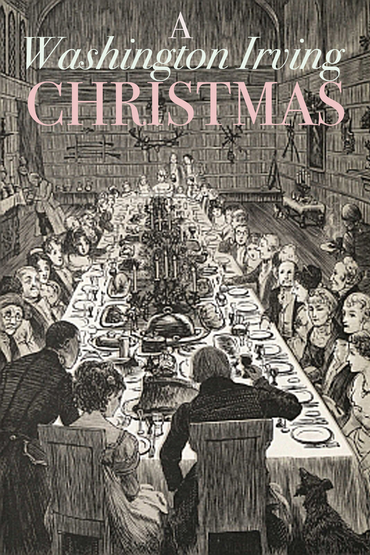Programming note: All this week I'm in for Nigel Farage on GB News at 7pm GMT - that's 2pm North American Eastern. On Tuesday after the show I'll also be joining Bo Snerdley/James Golden on 77 WABC at 4pm Eastern.
Meanwhile welcome to our third featured author in this year's season of Christmas Tales for Our Time. This year's trio is a grand variety: I picked one Canadian, one English, one American; one a humorist, one a writer of detective mysteries, and one the man who did more than any other US citizen to shape the American Christmas. I am not sure how many people read Washington Irving these days, but I would wager that a large proportion of those who don't are still vaguely familiar with his creation Rip van Winkle - and, if only through his memorialization in institutions like the New York Knicks, his fictitious Dutch historian Diedrich Knickerbocker..
An even larger number may be unaware of how much they're honoring Mr Irving in their Christmas jubilations. He it was who, in the 1812 edition of his History of New York, threw in a whimsical vignette in which St Nicholas flies over the treetops in a wagon while puffing on his pipe. No reindeer, but all the other elements of the American Santa are there.
Washington Irving loved the great village revelries of the old English Christmas, which the Puritans had left far behind them when they landed at Plimouth Plantation. The parlor games and community feasting and the notion of the Saviour's birth as a cause of merriment all appealed to him. In his famous and bestselling Sketch Book of 1819-1820 five chapters are devoted to lovingly detailed scenes from an English family Christmas as observed by a young visitor, and they proved so popular that half-a-century later (by which time almost all the elements had been imported into American life) they were published as a stand-alone book.
This first instalment opens with some general musings on the state of the season:
Many of the games and ceremonials of Christmas have entirely disappeared, and, like the sherris sack of old Falstaff, are become matters of speculation and dispute among commentators. They flourished in times full of spirit and lustihood, when men enjoyed life roughly, but heartily and vigorously; times wild and picturesque, which have furnished poetry with its richest materials, and the drama with its most attractive variety of characters and manners. The world has become more worldly. There is more of dissipation, and less of enjoyment. Pleasure has expanded into a broader, but a shallower stream...
Indeed. But, next thing you know, our narrator is boarding a stage coach and bound for a very merry old-time Christmas:
The coach was crowded, both inside and out, with passengers, who, by their talk, seemed principally bound to the mansions of relations or friends to eat the Christmas dinner. It was loaded also with hampers of game, and baskets and boxes of delicacies; and hares hung dangling their long ears about the coachman's box,—presents from distant friends for the impending feast. I had three fine rosy-cheeked schoolboys for my fellow-passengers inside, full of the buxom health and manly spirit which I have observed in the children of this country. They were returning home for the holidays in high glee, and promising themselves a world of enjoyment. It was delightful to hear the gigantic plans of pleasure of the little rogues, and the impracticable feats they were to perform during their six weeks' emancipation from the abhorred thraldom of book, birch, and pedagogue...
No birch, no pedagogues and precious few books in today's schools.
Members of The Mark Steyn Club can hear me read Part One of our Christmas with Washington Irving simply by clicking here and logging-in. And remember - a cavalcade of Christmas tales by everyone from Dickens to Steyn is awaiting you here.
If you'd like to know more about The Mark Steyn Club, please click here - and don't forget our Christmas Gift Membership. See you back here tomorrow, right after Tuesday's Farage and Snerdley shows, for Part Two of Washington Irving's Old Christmas.
























